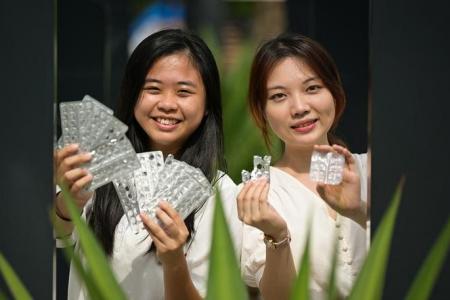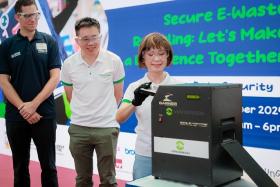NUS students come up with recycling method for medicine strips
Once the last pill is taken, a patient or nurse will - without giving it a second thought - discard the medicine strip, which is made of polluting plastic and sought-after aluminium.
Medicine strips - formally known as pharmaceutical blister packaging - cannot be recycled because they are made of plastic and aluminium heat-sealed together with a type of glue.
It is difficult to separate the materials in this multi-layer packaging so the strips are usually discarded as general waste.
To avoid having to throw them in the incinerators, a group of engineering students from the National University of Singapore (NUS) came up with a chemical recycling method to separate plastic from aluminium and salvage both components.
Both materials can then be sent to recycling companies.
This student initiative, called the Green Doctors Programme, was born last August when a pharmacist from the National University Hospital (NUH) approached the NUS department of Civil and Environmental Engineering to find a way to reduce medical waste.
Every month, commonly prescribed medicines at NUH account for about 200,000 medicine strips being used up.
Overall, about five million strips are thrown away every month in Singapore, said Ms Sophia Ding, founder of the Green Doctors Programme. She is a final-year civil and environmental engineering student at NUS.
Chemical recycling involves adding chemicals to the waste materials to break down their original structures.
Ms Ding declined to elaborate on her team's process to salvage the plastic and aluminium in the medicine strips as it is still in the early research phase.
After three months of research, the Green Doctors Programme concocted a recipe to dissolve the adhesive layer between the plastic and aluminium earlier this year, so that the materials can be separated.
The team, which includes about 10 chemical, environmental and mechanical engineering students, has been testing and working to optimise their solution using medicine strips provided by NUH.
"There were only two research papers on recycling medical blister packaging. So it was very difficult for us to come up with the methodology ourselves because we had to infer and go into the roots of the materials," said Ms Ding, 22.
"And we had to think about the technology that goes behind heat-sealing, and how to separate the layers without doing much harm to the original materials."
If all medicine strips in Singapore were to be recycled, 16 tonnes of plastic and 2 tonnes of aluminium could be saved each month, she added.
Professor Seeram Ramakrishna, chair of the NUS Circular Economy Taskforce, said much suitable medical or pharmaceutical waste is not recycled due to the challenges in segregating and pre-cleaning before recycling, in case it is biohazardous.
But he noted that recycling industries are keen on trying to recycle plastics and other disposables, which have been treated and certified as non-biohazardous.
Recently, hospitals and healthcare players in Singapore have been taking gradual steps to reduce their medical disposables and recycle them.
Since 2020, the Singapore General Hospital has been sending stainless steel disposables - such as surgical instruments and laryngoscope blades - to vendors for recycling.
The soiled instruments are thoroughly washed and decontaminated in the hospital, and between 450kg and 600kg of instruments are recycled each month.
By 2030, Alexandra Hospital plans to reduce its waste by 60 per cent and raise its recycling rate by the same amount.
The hospital has specific bins for staff to drop off plastic packaging, and older operating theatre gowns are turned into recycling bags, said its chief operating officer Jeffrey Chun.
From this year, most companies with an annual turnover of $10 million have to report the amount of packaging they use, and this includes pharmaceutical and medtech companies.
The Green Doctors Programme also plans to look into how other types of hard-to-recycle medical waste such as IV bags can be recycled.
Get The New Paper on your phone with the free TNP app. Download from the Apple App Store or Google Play Store now


